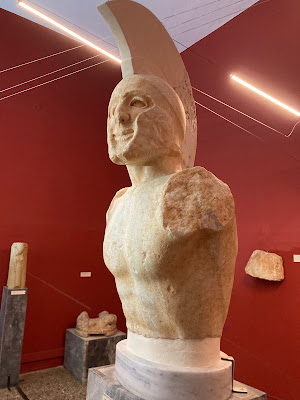Besides the citadel of Mystras, the city was in fact a complete city which befitted its status as the capital of the Despotate of the Morea including an administration center, shops, homes, and churches.
Pages
Monday, July 31, 2023
Greece 2023: Mystras II
Sunday, July 30, 2023
Going Abroad
"I always say to young people who are going abroad to study, 'Go if you want to, but be careful not to lose your faith; take only their expertise. And mostly importantly, do not forget to come home, to our Homeland. Greece is waiting for you. You owe her your help. Stay close to the Greek people. Help all those poor souls who would otherwise have to go overseas to find a doctor or a specialist. Be very careful not to let your hearts grow cold. The Europeans are cold people. And the United States of America is only for becoming wealthy in material goods and becoming spiritually bankrupt.'"
- Paisos the Athonite, With Pain and Love for Contemporary Man
Saturday, July 29, 2023
Greece 2023: Mystras I
The history of the Citadel and walled city of Mystras begins during the Frankish Conquest of Greece following the Fourth Crusade (1204 A.D.) when William II of Villehardouin, who ruled the Frankish principality of Achaea. Having just completed his conquest of Laconia in 1248 A.D., he chose a spur of Mt. Tagyetos - long famous in ancient literature as towering above Sparta - to build a fortress to control the region.
William was captured by Byzantine forces in 1259 A.D.; in 1262 A.D. the fortress was returned to the Byzantines. It was expanded and became the governmental seat of the Morea. Initially it served as a major fortress in the ongoing struggle between the Byzantines and the Franks. It continued to grow in importance until in 1349 A.D. it was declared a royal capital and the seat of the Despotate of the Morea. It survived the fall of Constantinople ibut was surrendered to the Ottoman Turks in 1460 A.D., the last major Byzantine territory in the Greek Peninsula (in an interesting historical footnote, it fell on the same day as Constantinople did, 9 years later). Other than being occupied by the Venetians briefly in the late 16th - early 17th century, it remained in Ottoman hands until 1823, when the local population was destroyed in the Greek War for Independence. A few families moved to the small town of Mystras at the foot of the mountain.
The city remains a unique archaeological site, a very well preserved walled city with many of its buildings intact - if you want to think about it such (I did), a sort of "What would Minas Tirith look like and be like in real life?" Short answer: Lots and lots of uneven stairs and climbing.
Today's views are all taken from the citadel. Next post we will visit the rest of the city.
Friday, July 28, 2023
Living On The Edge Of A Failing Society
Over the weekend while darning socks, I watched Blood and Gold on Netflix. The plot, set in May 1945, involves an escape plot, a revenge plot, and a "Get the Treasure" plot. It was far more entertaining than I had anticipated, although I do not know that I would heartily recommend it.
The fact that is the end of the War and the Americans are just beyond the horizon is a subtle pressure underlying the movie, that things need to be "done" by the time the Americans arrive.
Which then, of course, brought me to another thought entirely: What, I wonder, is if like to live in societies that are facing the end of existence?
Netflix's All Quiet On The Western Front asks this question as well (as does the book); The Last Days of Hitler is the same question at a higher level. But the question is relevant beyond ending of wars through German points of view. The same could be said of Edo Japan in 1866 or Royalist France in 1788 or Britain in 408 A.D. or Byzantium in some point during the 1440's or 1450's or even the Eastern Block circa 1988: the time between the clarity that the construct one is living in is not going to continue but before it actually fails.
On a personal level of course, I would have to imagine there is a lot of confusion and unrest. Does one flee? Does one stay in place? When the dust settles, will things be better or worse? - and this is not an irrelevant question: one of the sayings just prior to the conquest of Constantinople was "Better the Sultan's turban than the Pope's Miter" (e.g., better to live under Turkish rule than merge with Catholicism and given the history of the previous 250 years, not hard to understand), and surely those that have lived under any authoritarian society where they were victimized (National Socialism, Communism) cannot see anything much worse than what has happened before.
And surely there is a consideration of the past actions of one's life. In some cases, plans that were years or decades in the making are about to be turned into dust ascending in the wind. All that planning, all that scheming, all those years and years of work - gone in an short period of time.
Add to that the reality that for many, staying where they are is likely a bad idea and so one sees people fleeing hither and yon. Refugees moving away from advancing armies, refugees being turned back or away by people who themselves are effectively in the same situation.
What is like to see all of this coming, to realize it is happening, and yet to feel powerless to either change the outcome or to have a clear path toward safety?
I would imagine that one is also thinking about the "after" of the event: What will happen to me? What will the new society be like? Will I be a criminal? Will I have things taken away - or looted? What will it all look like - especially if I was an individual that had a stake in the society now passing away?
All of this compressed into months or even weeks, even as things continue to slide apart.
When, I wonder, does it become clear that all of this is happening and all of this needs to be thought of? For some of course, it will not be until the deluge is upon them, until the barricades have fallen and the crowds are in the street and things are being torn down. For others, it will be months or even years before the event; even for some it will be before the last feather comes to rest on the pile, tumbling the whole thing down.
In a way, perhaps, it is like the death sentence that we all invariably carry within us the moment we are born: we know we will die, we just do not know when or the circumstances. Within that knowledge, we try to make the best life we can for ourselves, knowing that there is only so much we can control and doing our best.
Plan for the best and prepare for the worst, as the saying goes.
Thursday, July 27, 2023
The Collapse CXII: Young Xerxes
06/09/20XX +1
Dear Mr. L:
Hi. My name...well, the name Mr. S gave me is Young Xerxes. He explained why at one time and showed me the reference in the book he got it from. I smiled and nodded – I do that a lot with Mr. S – and just wrote it up to the most unusual nickname I had ever gotten.
Mr. S insisted that I write a letter to you. I explained to him that I had never met you and why would I write a letter to someone I had never met if I did not need anything and was likely not to meet them. He insisted though; he is very polite about his insisting but very firm. Sometimes it is just easier to do it. When I asked him what to write, he said “Just tell him about yourself”.
When I was twelve years old I got a book called One Man’s Wilderness. You may have read it; it is about a guy who moves to Alaska and builds a house for himself. Seeing the pictures and reading his story, I decided that the sort of thing I wanted to do when I grew up. As you might imagine, when I told my parents I was going to go live in the woods for a living, they did not have a great response. They laughed, told me to study hard and finish high school and go on in my education, and then I could think about vacations in the woods wherever I wanted to go.
I listened to what they said – and kept reading, anything I could find on roughing it and camping and learning to build things and really, just survival. And practiced everything I could – I scorched our lawn so much from practicing starting fires I was finally banished from it.
I left home when I was 20: I took an AA degree at my local community college and did not look back. I wandered for a few years – turns out with the right set of skills you can always find work and living cheaply is not a problem for a single young guy that would rather save money than live fancy. The goal was a picture I kept on the sun visor of my truck of that cabin the guy had built in One Man’s Wilderness: my own place, away from everybody.
My being here in The Garnet Valley was luck as much as planning. One of the organizations I really followed had a number of people that lived up here doing the sorts of things I wanted to do. I always looked for property everywhere I stopped and worked. Here, something worked – it was essentially a dirt spot by the river, but it became my dirt spot by the river. With power, which was more than the cabin in One Man’s Wilderness had.
Traveling around and finding work all the time, you find out it is pretty easy to make friends and meet people. Just be useful, listen a lot, and give a little more than is expected. As I worked on living here – the first Winter was harder than I thought, and I tried to be ready – I met people and just sort of fit in with the folks and their mindset here.
I met my girlfriend – Mr. S. calls her Statera or Statira or something like that, he explained it and showed me the book again – while I was doing that. She’s a dream, Mr. L – likes what I like, likes living here, and likes the idea of doing things for yourself when possible. Her mom is pretty great as well. As this letter is just between you and me, I’m hoping things work out for her and Mr. S. He won’t say anything to me about their relationship, but she and my girlfriend talk a lot about him and her.
I like Mr. S. I sort of knew who he was before everything happened – it is a small town, after all – but I really did not get to know him more until everything fell apart. He is pretty cool and knowledgeable about something things – every time I have a question about something, he almost always is able to find something in his books – and pretty clueless about other things, especially living here. That’s not surprising – lots of people who move here have to learn a lot; it’s a tough place to live if you’re not ready.
I hope I get to meet you someday, Mr. L. If Mr S. is any indication, you are a pretty cool and knowledgeable guy too.
Your Friend, Young Xerxes
Wednesday, July 26, 2023
Tuesday, July 25, 2023
Tales From Produce (A)Isle: The Box Compactor
We have a fairly small amount of equipment we use on Produce (A)Isle. We have small two level/four wheeled carts we use for our general activities (top shelf is for produce, bottom shelf has a small metal box for water/wipes/bags and a space for a cardboard box for culls) and longer six wheel carts called "U-boats" that hold the bulk of the produce in boxes for wheeling in and out of the walk-in. Occasionally we make use of a pallet jack.
And then, there is the Box Compactor.
The Box Compactor lives at the end of the back-end wall behind the main store, at the corner of the building. It probably 8-10 feet long, blue, and 8 feet or so high. The theory is that one puts the puts one's cardboard into the chamber. At some point it is full enough that one pulls down the outer cage door which is engaged by a magnetic lock and turns the key. A giant orange plate descends from the top and compacts everything into below it, then slowly comes up. The cardboard is crushed and one can add more. At some point (seemingly undefined; there is no mark in the interior of the unit nor is there a picture anywhere) the unit is "full" and as such, needs to be bundled up. There is a list of responsible departments by day of the week for performing this task.
The unit has a lot of capacity but not endless capacity. And people keep adding cardboard to the compactor.
I am sure you can see where this is going.
At some point, the unit is simply "topped off" and no more cardboard can reasonably go in. But no-one shows up to take care of the issue.
I suspect everyone finds work arounds. We do. We flatten the cardboard, stack the cardboard on carts. Others will drop the cardboard off by the the unit, as if to leave a visual hint that it is full.
This is one of those odd things that I am not sure what the protocol is on it. There are no instructions for who to contact in the vent it is full other than "department"; and I am pretty sure the new guy popping in and asking about if cardboard is going to be pulled out is as welcome as being the closing manager suggesting there are just "a few" more things to do to get done before closing time.
There is a system and an order to all companies, a system which is beyond the training one does upon arrival: it is the secret system of "the way things actually work", the observed portions of human behavior that are not formally written down anywhere but are incredibly relevant. These are the pecking orders and rituals and daily routines of the workplace that act as the social lubricant to make things work and get things done. It is the hidden codex, locked away that no-one sees when they first show up - like any good game, one has to find it through one's own adventures and missed guesses.
And so I continue my trip back to the corner, cardboard on my cart, wondering before I arrive if I will find a compactor empty or full. It may not be world ending suspense, but it certainly makes every trip back there something of an adventure.
Monday, July 24, 2023
Greece 2023: This. Is. Sparta.
When we first talked about going to Greece, my first immediate question was if we could go to Sparta.
I asked this knowing that the answer was likely no - the actual ruins of Sparta are pretty sparse and pale in comparison to what remains in Athens - even the Greeks of the Classic period commented that it would be hard to believe for future generations to believe that the location of Sparta had ever been as significant as it was because there was nothing like what one saw in Athens - for example, in the Archaic and Classical period there was never a wall around Sparta like virtually every other Greek city - as Thucydides said:
"Suppose, for example, that the city of Sparta were to become deserted and that only the temples and foundations of buildings remained. I think that future generations would, as time passed, find it very difficult to believe that this place had really been as powerful as it was represented to be...Since, however, the city is not regularly planned and contains no temples or monument of great magnificence, but is simply a collection of villages, in the ancient Hellenic way, its appearance would not come up to expectation."
Beyond a dearth of things to see, there is the simple fact that it is three hours south of Athens in the Peloponnese, a city on the side of the road between other places. One does not, I suspect, "go" to Sparta unless one has a real reason for doing so.
In a gift of great kindness, The Ravishing Mrs. TB paid for a tour and so Nighean Dhonn and myself got up early one morning for a day tour.
In going to Sparta, one has to pass the Isthmus of Corinth. The isthmus is 6.3 miles/3.9 kilometers at its narrowest point. Control of the Isthmus is what brought great wealth to the city of Corinth. At one time, cargo and ships could be tran-shipped over the Isthmus by the Diolkos, a stone pathway 2hich may have used a wheeled cart. The canal was finally dug and finished in 1893 - it is only 80 feet/24 m wide and around 21 feet/7 meters deep, and so really is only used for smaller boats at this point.
Unlike the Acropolis of Athens, Ancient Sparta is not teeming with tourists: it almost reminds one of a regional park. There is no fee for entrance and beyond ourselves, there were likely not half a dozen people there, including park personnel. Like many sites, it is a hodgepodge of ruins from various periods.
Below are the ruins of "The Round Building". There are no firm conclusions on what this was; the blocks are from the Roman Restoration in the early 1st Century A.D.
In the end, Thucydides' was correct: The ruins of Sparta hardly demonstrate any sort of powerful city state at all, and belie the fact that it was one of the most powerful for almost 300 years.






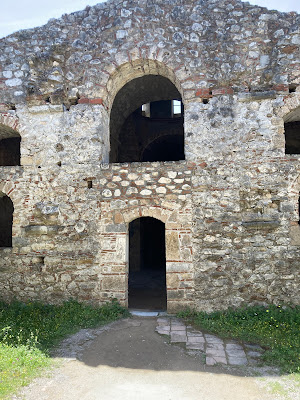





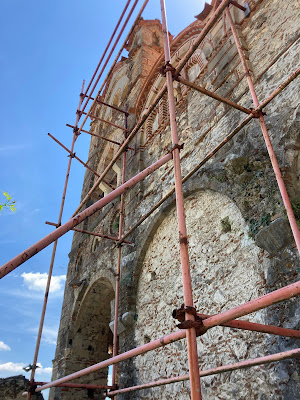


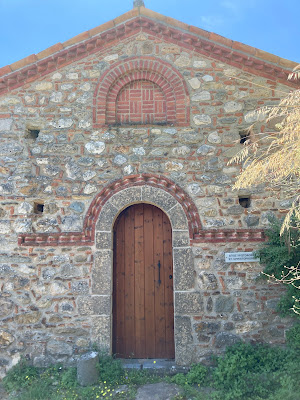





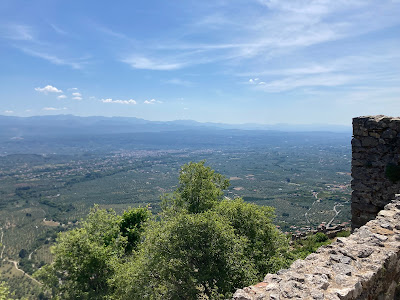


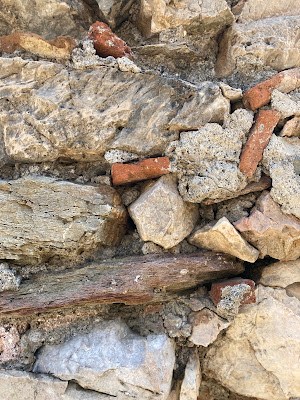








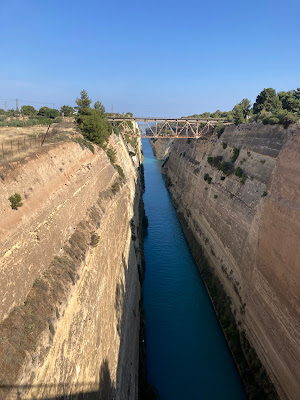






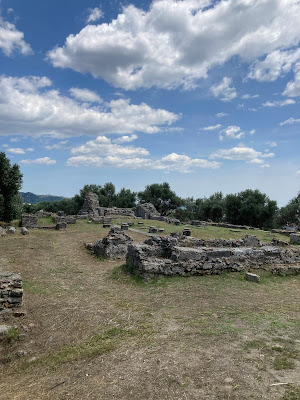











.jpg)

